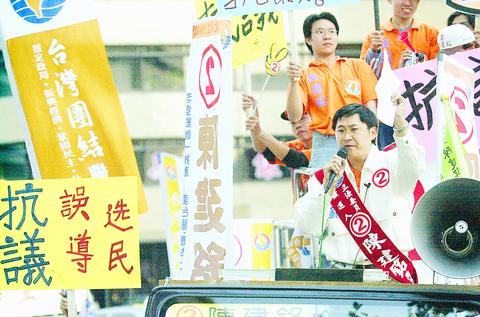Stabilizing the political situation, boosting the economy, safeguarding democracy and upholding Taiwan's sovereignty are the four priorities of the Taiwan Solidarity Union (TSU).
"On the political front, downsizing the legislature and reforming the Constitution will be the group's primary promises in the upcoming elections," party Chairman Huang Chu-wen (黃主文) has said.
Given that voters have become disillusioned with the bitter acrimony that characterizes the legislature, Huang said the party advocates halving the seats in the Legislative Yuan from 225 to 100.

PHOTO: HSIN YUEH-HUNG and LU CHUN-WEI, TAIPEI TIMES
On reforming the Constitution, the group supports replacing the current semi-presidential, five-branch system with a stronger three-branch presidential system.
Because people have been able to elect the president directly since 1996 and the president's nomination for premier no longer needs the approval of the legislature, Taiwan has adopted a presidential system, Huang said.
"Rewriting the constitution to create a three-branch presidential system will put to rest the ferocious debate between politicians and scholars about what is the true spirit of Taiwan's Constitution."
To prevent political struggles from hindering economic development, the TSU advocates prioritizing legislative bills related directly to people's lives.
On trade, the group supports reforming government policy on cross-strait trade, particularly the "no haste, be patient" policy on China-bound investment.
On Nov. 7, the government replaced the "no haste" policy introduced by former president Lee Teng-hui
Lee has said the new measure will work well, but warned that the government should stress the "effective management" part of its new policy to protect Taiwan's national and economic security as well as the personal safety of Taiwan's businessmen.
An issue close to the heart of the TSU is Taiwan's sovereignty. The party has warned that the nation should not fall into the "one China" trap created by Beijing. It suggests Taiwan engage the international community as much as possible and try to improve cross-strait relations through peaceful measures.
"The party aims to uphold the people's welfare and national security by seeking the condition that if China does not use force against Taiwan, Taiwan will not declare independence," Huang said. According to the TSU party platform, there is no controversy concerning whether Taiwan should claim independence. The issue is "whether Taiwanese will agree to be ruled by China."
The party also rejects China's proposal to govern Taiwan following the "one country, two systems" model used for Hong Kong.
The TSU supports Lee's initiatives, who, during his 12 years in power, handed control of the military to the government. Under KMT, rule the government and the KMT were almost indistinguishable, and they jointly ran the military.

SECURITY: As China is ‘reshaping’ Hong Kong’s population, Taiwan must raise the eligibility threshold for applications from Hong Kongers, Chiu Chui-cheng said When Hong Kong and Macau citizens apply for residency in Taiwan, it would be under a new category that includes a “national security observation period,” Mainland Affairs Council (MAC) Minister Chiu Chui-cheng (邱垂正) said yesterday. President William Lai (賴清德) on March 13 announced 17 strategies to counter China’s aggression toward Taiwan, including incorporating national security considerations into the review process for residency applications from Hong Kong and Macau citizens. The situation in Hong Kong is constantly changing, Chiu said to media yesterday on the sidelines of the Taipei Technology Run hosted by the Taipei Neihu Technology Park Development Association. With

CARROT AND STICK: While unrelenting in its military threats, China attracted nearly 40,000 Taiwanese to over 400 business events last year Nearly 40,000 Taiwanese last year joined industry events in China, such as conferences and trade fairs, supported by the Chinese government, a study showed yesterday, as Beijing ramps up a charm offensive toward Taipei alongside military pressure. China has long taken a carrot-and-stick approach to Taiwan, threatening it with the prospect of military action while reaching out to those it believes are amenable to Beijing’s point of view. Taiwanese security officials are wary of what they see as Beijing’s influence campaigns to sway public opinion after Taipei and Beijing gradually resumed travel links halted by the COVID-19 pandemic, but the scale of

A US Marine Corps regiment equipped with Naval Strike Missiles (NSM) is set to participate in the upcoming Balikatan 25 exercise in the Luzon Strait, marking the system’s first-ever deployment in the Philippines. US and Philippine officials have separately confirmed that the Navy Marine Expeditionary Ship Interdiction System (NMESIS) — the mobile launch platform for the Naval Strike Missile — would take part in the joint exercise. The missiles are being deployed to “a strategic first island chain chokepoint” in the waters between Taiwan proper and the Philippines, US-based Naval News reported. “The Luzon Strait and Bashi Channel represent a critical access

Pope Francis is be laid to rest on Saturday after lying in state for three days in St Peter’s Basilica, where the faithful are expected to flock to pay their respects to history’s first Latin American pontiff. The cardinals met yesterday in the Vatican’s synod hall to chart the next steps before a conclave begins to choose Francis’ successor, as condolences poured in from around the world. According to current norms, the conclave must begin between May 5 and 10. The cardinals set the funeral for Saturday at 10am in St Peter’s Square, to be celebrated by the dean of the College